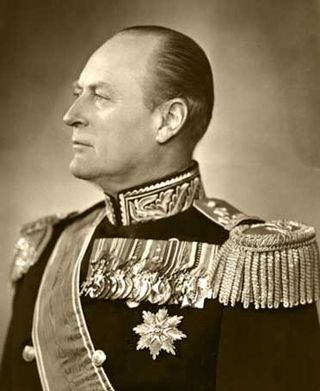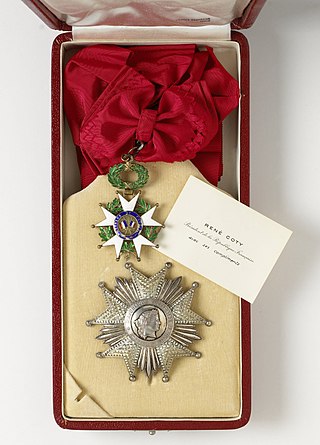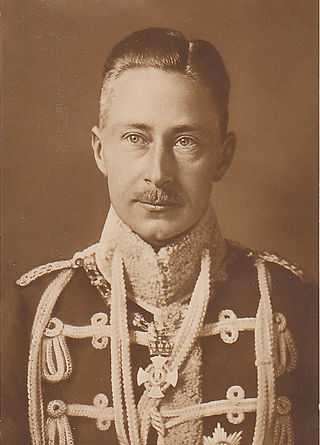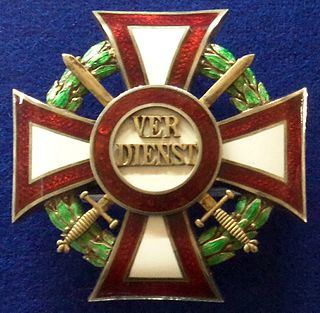The War Merit Cross was a military decoration of the Third Reich.
War Merit Cross may also refer to:
The War Merit Cross was a military decoration of the Third Reich.
War Merit Cross may also refer to:

The Legion of Merit (LOM) is a military award of the United States Armed Forces that is given for exceptionally meritorious conduct in the performance of outstanding services and achievements. The decoration is issued to members of the eight uniformed services of the United States as well as to military and political figures of foreign governments.

Olav V was the King of Norway from 1957 until his death in 1991.

The National Order of the Legion of Honour, formerly the Royal Order of the Legion of Honour, is the highest French order of merit, both military and civil. Established in 1802 by Napoleon Bonaparte, it has been retained by all later French governments and regimes.

Wilhelm, German Crown Prince, Crown Prince of Prussia was the eldest child of the last Kaiser, the German Emperor, Wilhelm II, and his consort Augusta Victoria of Schleswig-Holstein. As Emperor Wilhelm's heir, he was the last Crown Prince of the German Empire and the Kingdom of Prussia.
Awards and decorations of Nazi Germany were military, political and civilian decorations that were bestowed between 1923 and 1945, first by the Nazi Party and later the state of Nazi Germany.

Wilhelm List was a German field marshal during World War II who was convicted of war crimes by a US Army tribunal after the war. List commanded the 14th Army in the invasion of Poland and the 12th Army in the invasions of France, Yugoslavia and Greece. In 1941 he commanded the German forces in Southeast Europe responsible for the occupation of Greece and Yugoslavia. In July 1942 during Case Blue, the German summer offensive in Southern Russia, he was appointed commander of Army Group A, responsible for the main thrust towards the Caucasus and Baku.

Grand Cross is the highest class in many orders, and manifested in its insignia. Exceptionally, the highest class may be referred to as Grand Cordon or equivalent. In other cases, there may exist a rank even higher than Grand Cross, e.g. Grand Collar. In rare cases, the insignia itself is referred to as the "grand cross".

The War Order of the German Cross, normally abbreviated to the German Cross or Deutsches Kreuz, was instituted by Adolf Hitler on 28 September 1941. It was awarded in two divisions: in gold for repeated acts of bravery or military leadership; and in silver for distinguished non-combat war service. The German Cross in Gold ranked higher than the Iron Cross First Class but below the Knight's Cross of the Iron Cross, while the German Cross in Silver ranked higher than the War Merit Cross First Class with Swords but below the Knight's Cross of the War Merit Cross with Swords.

The War Merit Cross was a state decoration of Nazi Germany during World War II. By the end of the conflict it was issued in four degrees and had an equivalent civil award. A "de-Nazified" version of the War Merit Cross was reissued in 1957 by the Bundeswehr for its veterans.
Authorized foreign decorations of the United States military are those military decorations which have been approved for wear by members of the United States armed forces but whose awarding authority is the government of a country other than the United States.
An order of merit is conferred by a state, government or royal family on an individual in recognition of military or civil merit.
Gold Cross or Golden Cross may refer to:

The Military Merit Cross was a decoration of the Empire of Austria and, after the establishment of the Dual Monarchy in 1867, the Empire of Austria-Hungary. It was first established on October 22, 1849 and underwent several revisions to its design and award criteria over the years of its existence. It became obsolete in 1918 with the dissolution of the Austro-Hungarian Empire.

The Military Merit Medal was a military decoration of the Empire of Austria-Hungary. It was founded by Emperor Franz Joseph I on March 12, 1890. The Military Merit Medal is often referred to as the "Signum Laudis" after the inscription on the reverse of the medal.
Orders, decorations, and medals of the German Empire covers those decorations awarded by the states which came together under Prussian leadership to form the German Empire in 1871. For convenience's sake, this category also covers the decorations of the various German states which were no longer in existence in 1871, mainly because they had been annexed by Prussia during the Wars of Unification or before.
A Cross of Merit is a personal decoration which is generally above the rank of medal and below that of knight, and may refer to:

The orders, decorations and medals of Finland form a system through which the Finnish government shows its respect to persons who have distinguished themselves on some walk of life. The legal basis of the system is the Act on the displays of public recognition (1215/1999) which grants the president the authority to issue decrees on orders, medals and titles.
The War Merit Cross is an Italian military decoration. It was instituted by King Victor Emmanuel III during World War I on 19 January 1918. The award received major changes during World War II and is issued by the Italian Republic as well.
The Greek honors system goes back to 1829 and the establishment of the Order of the Redeemer at the Fourth National Assembly at Argos. However, the relevant decree was signed in Nafplio by King Otto on May 20, 1833. The Grand Cross of the Order of the Redeemer remains the highest honor of Greece to this day.